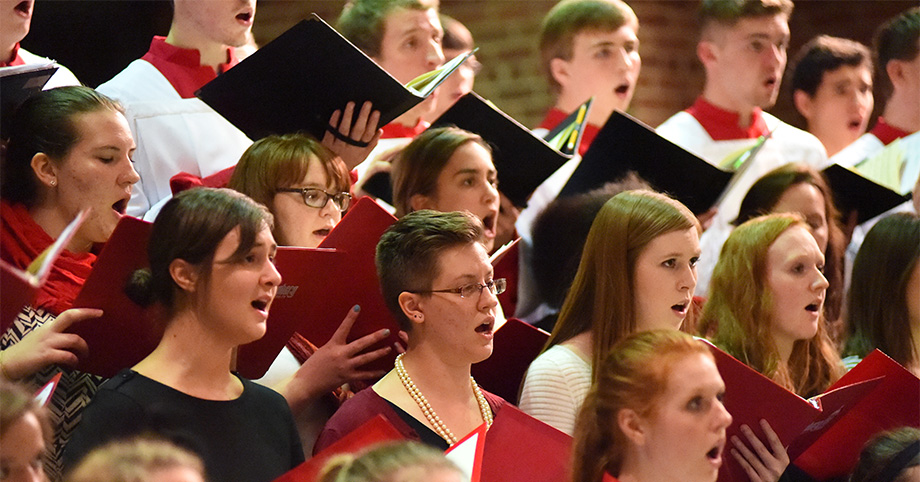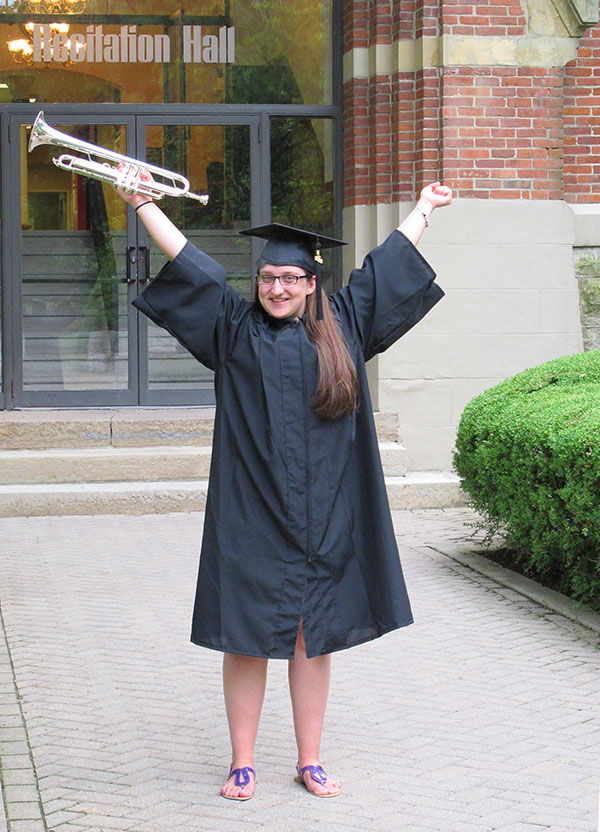 Enter the world of music: music ensembles, vocal and instrumental music lessons, a variety of music courses, a music minor and two music majors!
Enter the world of music: music ensembles, vocal and instrumental music lessons, a variety of music courses, a music minor and two music majors!
Recommendations for New Students, Fall 2024
Music majors, sign up for:
- Applied music lessons and a music ensemble (see list below).
- Music 102 Basic Music Theory & Skills (unless you have exempted through the music department placement test, or an AP exam score of 4 or 5).
- If you are pursuing the BME, also sign up for: Music 231 Woodwind Instruments. (Or it can easily be added later, if not listed in the initial course selection list.)
Music minors, sign up for:
- Applied music lessons and a music ensemble (see list below).
- Music 102 Basic Music Theory & Skills or Music 110 Understanding Music.
Non-majors and non-minors, you may sign up for:
- Applied music lessons and a music ensemble (see list below).
- Music 110 Understanding Music (does not require music reading) or Music 102 Basic Music Theory & Skills (does require music reading).
To register for music ensembles or music lessons, please email or visit the music department office (dunlape@wittenberg.edu). Music ensembles:
Music 175 Jazz Ensemble
Music 177 Chamber Orchestra
Music 179 Symphonic Band
Music 185 Wittenberg Choir
Music 187 Wittenberg Singers
Music 197 Percussion Ensemble
Learn more about Wittenberg music ensembles.
Music Degrees
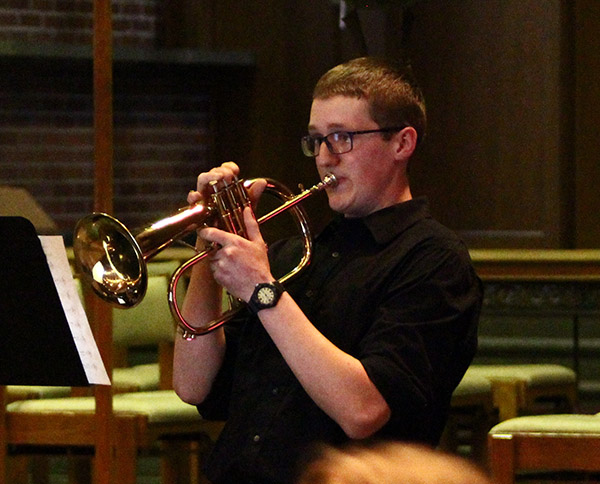 Wittenberg offers a music minor and these two music majors:
Wittenberg offers a music minor and these two music majors:
The B.A. in Music (Bachelor of Arts in Music) leads to many different careers because it allows considerable flexibility in course selection. It is often combined with a major or minor in another field, such as communication, management, biology, psychology, or English. Some students earn a B.A. in Music as a path toward a career in music therapy.
The B.M.E. (Bachelor of Music Education) leads to certification for public school instruction (choral, instrumental, and general music).
To declare a major in music (B.A. or B.M.E.), it is necessary to perform an audition that demonstrates satisfactory skill in vocal or instrumental performance.
Course Listings
- To read complete descriptions of the music courses offered at Wittenberg, click here (p. 246).
B.A. in Music
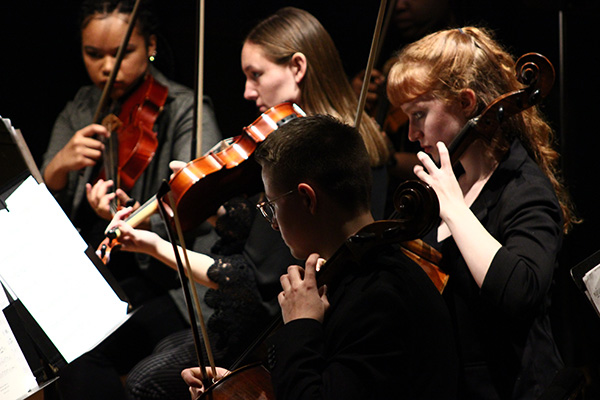
Photo credit: Meghan Nadzam
Music Theory
- MUSI 102: Basic Music Theory & Skills, 4 credits
- MUSI 155: Intermediate Music Theory I, 2 credits
- MUSI 257: Intermediate Music Theory II, 2 credits
- MUSI 259: Analysis of Music after 1900, 2 credits
Aural Skills & Dictation
- MUSI 156: Intermediate Music Skills I, 2 credits
- MUSI 258: Intermediate Music Skills II, 2 credits
Keyboard Skills
- MUSI 120: Functional Keyboard Skills, 2 credits
- MUSI 221: Advanced Keyboard Skills & Improvisation, 2 credits
Music History / Musicology
- MUSI 304: History of Western Music to 1750, 4 credits
- MUSI 305: History of Western Music, 1750-Present, 4 credits
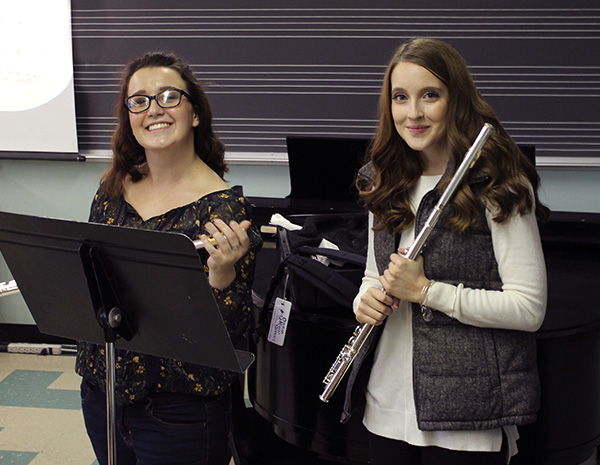 Other
Other
- Applied Music Lessons: 4 credits and recital or studio class performance annually.
- Music Ensemble: 4 credits (Participation in music ensemble/ensembles is required of all music majors every semester on campus.)
- MUSI 495: Senior Recital and Paper, or MUSI 498: Senior Project, 2 credits
Electives in Music 10 credits, selected from at least two of these groups:
- Music theory: MUSI 214, 355, 357, 450, or appropriate topics courses (Music 212 or 380)
- Music history / musicology courses: MUSI 203, 205, 215, 216, 220, or appropriate topics courses (Music 212 or 380)
- Additional applied music lessons or Music 350 Introduction to Conducting or Music 351 Choral & Instrumental Conducting
TOTAL CREDITS: 42
B.M.E. (Bachelor of Music Education)
Music Theory

Photo credit: Meghan Nadzam
- MUSI 102: Basic Music Theory & Skills, 4 credits
- MUSI 155: Intermediate Music Theory I, 2 credits
- MUSI 257: Intermediate Music Theory II, 2 credits
- MUSI 259: Analysis of Music after 1900, 2 credits
Aural Skills & Dictation
- MUSI 156: Intermediate Music Skills I, 2 credits
- MUSI 258: Intermediate Music Skills II, 2 credits
Keyboard Skills
- MUSI 120: Functional Keyboard Skills, 2 credits
- MUSI 221: Advanced Keyboard Skills & Improvisation, 2 credits
Music History / Musicology
- MUSI 304: History of Western Music to 1750, 4 credits
- MUSI 305: History of Western Music, 1750-Present, 4 credits
Other
- Applied Music Lessons, primary area: 7 credits and recital or studio class performance annually.
- Applied music examination for advanced standing, for non-credit
- Applied Music Lessons, keyboard area: 2 credits
- Music Ensemble: 4 credits (Participation in music ensemble/ensembles is required of all music majors every semester on campus.)
- MUSI 216: Musics of the World, 4 credits
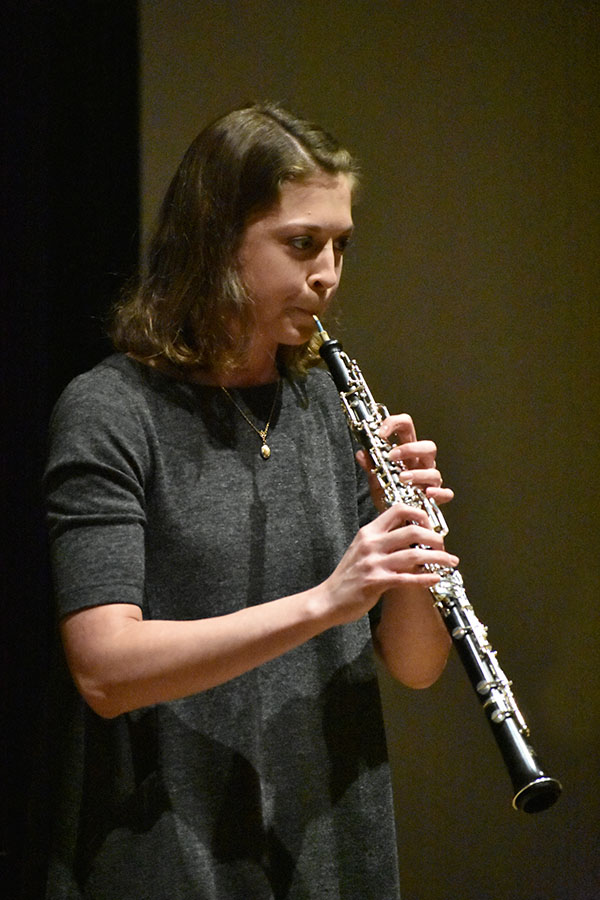
Photo credit: Meghan Nadzam
- MUSI 250: Technology for Music Educators, 2 credits
- MUSI 350: Introduction to Conducting, 2 credits
- MUSI 351: Choral & Instrumental Conducting, 2 credits
- MUSI 231, 232, 233, and 234: Instrumental methods & techniques, 1 credit each
- MUSI 231: Woodwind Instruments
- MUSI 232: Brass Instruments
- MUSI 233: Percussion Instruments
- MUSI 234: String Instruments - MUSI 235: Introduction to Vocal Pedagogy & Diction, 2 credits
- MUSI 165: Introduction to Music Education, 3 credits
- MUSI 463: General Music Methods, 4 credits
- MUSI 464: Choral Music in the Schools, 3 credits
- MUSI 465: Instrumental Music in the Schools, 3 credits
- MUSI 494: Student Teaching, 12 credits
- MUSI 497: Senior Portfolio Review, for non-credit
TOTAL CREDITS IN MUSIC: 74
- EDUC 103 or 104: Sociological Perspectives in Education or Philosophical Perspectives in Education, 4 credits
- EDUC 120: Introduction to Students with Special Needs, 2 credits
- EDUC 203: Early Childhood Development and Education OR Educ 213: Adolescent Development and Education, 3 credits
- EDUC 312: Reading and Writing in Content Areas, 3 credits
- Successful completion of the State Board of Education Examinations, for non-credit
TOTAL CREDITS IN EDUCATION: 12
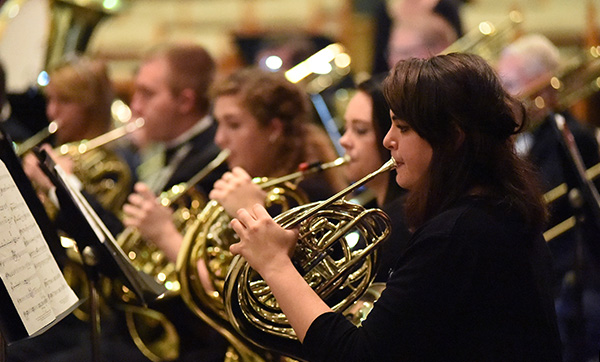 Music Minor
Music Minor
- MUSI 102: Basic Music Theory and Skills, 4 credits
- MUSI 110: Understanding Music, 4 credits
- Eight credits selected from courses in the range of Music 201-220 and/or 301-320
- Applied Music lessons and/or Music Ensemble, 4 credits
TOTAL CREDITS: 20
Music Ensembles
Instrumental Ensembles (0 to 1 credit)
- MUSI 175: Jazz Ensemble
- MUSI 177: Chamber Orchestra
- MUSI 179: Symphonic Band
- MUSI 191: Flute Choir
- MUSI 197: Chamber Ensemble-Percussion
Choral and Vocal Ensembles (0 to 1 credit)
- MUSI 185: Wittenberg Choir
- MUSI 187: Wittenberg Singers
